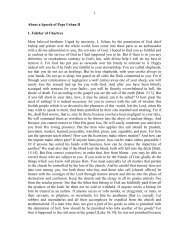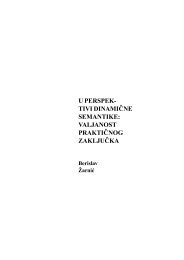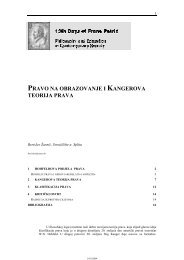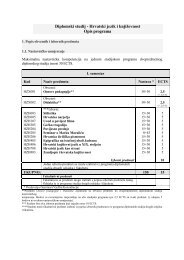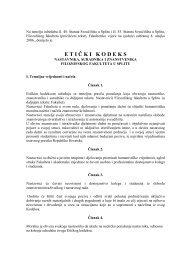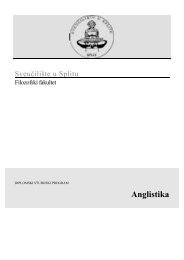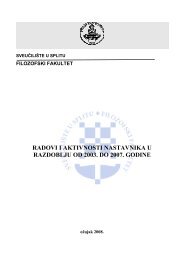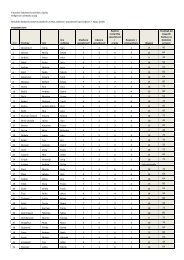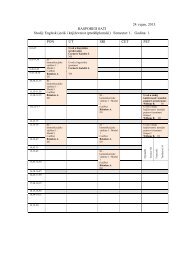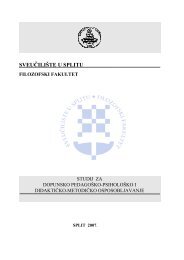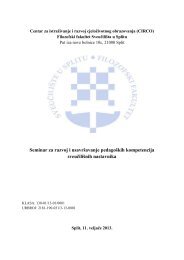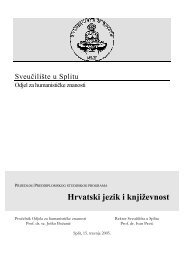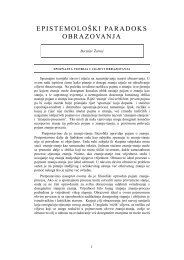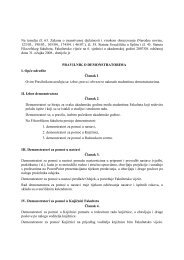English Studies
English Studies
English Studies
Create successful ePaper yourself
Turn your PDF publications into a flip-book with our unique Google optimized e-Paper software.
G R A D U A T E D E G R E E P R O G R A M M E : E N G L I S H S T U D I E S<br />
Language of<br />
instruction<br />
Quality<br />
assurance<br />
methods<br />
Croatian and <strong>English</strong>.<br />
1. Student feedback via questionnaires and surveys.<br />
2. Lecturers responsible for the same subject area collaborate closely and<br />
monitor each other's work. Occasional class observations and appraisal by<br />
Head of Department.<br />
Course title Interpreting – Module 1<br />
Course code HZE810<br />
Type of course Exercise course / Advisory hours<br />
Core course (Elective course in 3.1.1.)<br />
Level of course Specialized level course<br />
Year of study Second Semester Three<br />
ECTS<br />
(Number of<br />
credits allocated)<br />
3 ECTS<br />
Contact hours (25 practical sessions + 5 advisory hours) = 0.75 credits.<br />
Student study time (67.5 hours) = 2.25 credits.<br />
Name of lecturer Prof Dr Zjena Čulić<br />
Learning<br />
outcomes and<br />
competences<br />
The course focuses on the development of the following competences and<br />
skills: comprehension (analysis and synthesis), speed of comprehension,<br />
production, memory capacity, simultaneity of listening and speaking,<br />
personality traits (stress tolerance).<br />
Prerequisites Competences and skills acquired upon the completion of Translation studies<br />
with elements of contrastive analysis and Translation Methodology - Theory<br />
and Practice courses.<br />
Course contents Process-oriented approach in interpreter training; developing techniques for<br />
translation at sight; consecutive translation and simultaneous translation; the<br />
comprehension phase based on knowledge base and knowledge acquisition;<br />
reformulation of the message; note taking strategies. Application of the<br />
Effort model: listening effort, comprehension effort and reformulation<br />
effort. Interpretation training from the point of view of professional<br />
experience and current teaching practices; the task of interpreting analyzed<br />
from a cognitive psychologist’s point of view; interaction between research<br />
and training; simultaneous interpretation composed of a series of<br />
interdependent skills; cognitive psychology applied to research on aptitude<br />
testing for interpretation; Theorie du sens; research frame moving from<br />
cognitive content to the transfer of formal linguistic features; observation of<br />
Recommended<br />
reading<br />
Supplementary<br />
reading<br />
interpreters at work.<br />
Gambier, Y. Gile, D., & Taylor, Ch. (Eds.). (1997). Conference<br />
Interpreting: Current Trends in Research. Amsterdam, Philadelphia:<br />
John Benjamins Publishing Company.<br />
Dollerup, C., & Lindegaard, A., (Eds.). (1994). Teaching Translation and<br />
Interpreting 2. Amsterdam, Philadelphia: John Benjamins Publishing<br />
Company.<br />
Lambert, S., & Moser Mercer, B. (1994). Bridging the Gap: Empirical<br />
research in simultaneous interpretation. Amsterdam, Philadelphia: John<br />
56



